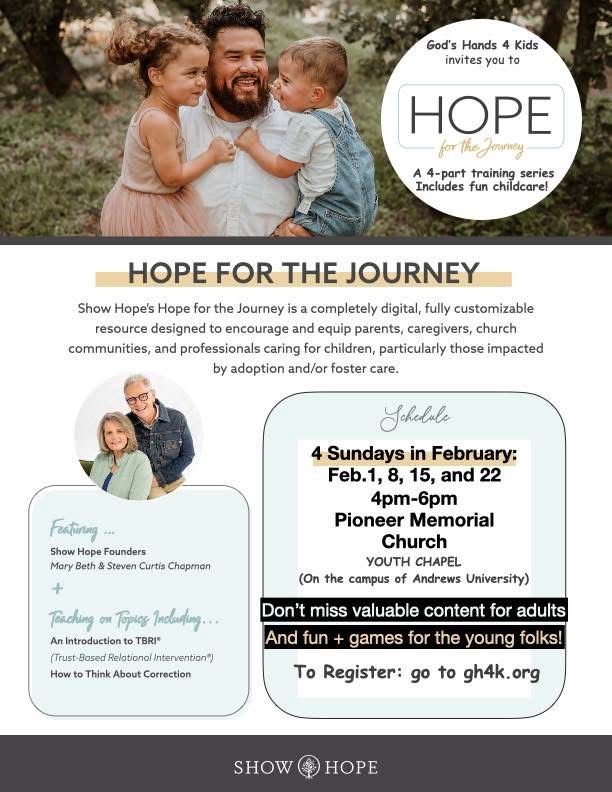God's Hands 4 Kids, a PMC Grow Group outreach to our community serving foster, adoptive, kinship and guardianship families partnering with Berrien County Department Of Health and Human Services. As a gift to the families served by them and as a gift to the community of ministry leaders and professionals, we will be providing Hope for the Journey, a video conference on Trust Based Relational Intervention - trauma, on Sunday afternoons in February here at PMC. It is produced by Show Hope. For more information and to register go to our website GH4K.org

The Galilean
The Galilean: Grace Notes for Dis-Grace - 5
Speaker
Dwight K. NelsonDwight Nelson served as lead pastor of the Pioneer Memorial Church on the campus of Andrews University from 1983 to 2023. During his time at Pioneer he spoke on the “New Perceptions” telecast, taught at the theological seminary and has written books, including The Chosen. He and his wife, Karen, are blessed with two married children and 2 granddaughters.
Offering
More In This Series
“The Galilean: Grace Notes for Dis-grace”
W. H. Auden:
“I know nothing, except what everyone knows— if there when dances,
I should dance.”
Philip Yancey:
“Grace means there is nothing we can do to make God love us . And grace means there is nothing
we can do to make God love us .”
(What’s So Amazing About Grace 70)
□ Matthew 26-27: A Tale of Two Young Men
-
Desire of Ages: “Now [Judas] pretends to have no part with them. Coming close
to Jesus, he takes His hand as a familiar friend. With the words, ‘Hail, Master,’ he kisses Him repeatedly, and appears to weep as if in sympathy with Him in His peril. Jesus said to him, “, wherefore art thou come?” His voice trembled with sorrow as He added, ‘Judas, betrayest thou the Son of man with a kiss?’ This appeal should have aroused the conscience of the betrayer, and touched his stubborn heart; but honor, fidelity, and human tenderness had forsaken him. He stood bold and defiant, showing no disposition to relent. He had given himself up to Satan, and he had no power to resist him. Jesus did not refuse the traitor’s kiss.” (696)
-
Desire of Ages: “While the degrading oaths were fresh upon Peter’s lips, and the shrill crowing of the cock was still ringing in his ears, the Saviour turned from the frowning judges, and looked full upon His poor disciple. At the same time Peter’s eyes were drawn to his Master. In that gentle countenance he read deep pity and sorrow, but there was no anger there. The sight of that pale, suffering face, those quivering lips, that look of compassion and , pierced his heart like an arrow. Conscience was aroused. Memory was active. . . . Peter had just declared that he knew not Jesus, but he now realized with bitter grief how well his Lord knew him, and how accurately He had read his heart, the falseness of which was unknown even to himself. A tide of memories rushed over him. The Saviour’s tender mercy, His kindness and long-suffering, His gentleness and patience toward His erring disciples—all was remembered. . . . Once more he looked at his Master, and saw a sacrilegious hand raised to smite Him in the face. Unable longer to endure the scene, he rushed, heartbroken, from the hall. He pressed on
in solitude and darkness, he knew not and cared not whither. At last he found himself in Gethsemane. . . . On the very spot where Jesus had poured out His soul in agony to His Father, Peter fell upon his face, and wished that he might die.” (712, 713
- Desire of Ages: “Judas now cast himself at the feet of Jesus, acknowledging Him to be the Son of God, and entreating Him to deliver Himself. The Saviour did not reproach His betrayer. He knew that Judas did not repent; his confession was forced from his guilty soul by an awful sense of condemnation and a looking for of judgment, but he felt no deep, heartbreaking grief that he had betrayed the spotless Son of God, and denied the Holy One of Israel. Yet Jesus spoke no word of condemnation. He looked pityingly upon Judas, and said, For this hour came I into the world.” (722)
□ What made the difference?
-
David Seamands: “Many years ago I was driven to the conclusion that the two
major causes of most emotional problems among evangelical Christians are these: the failure to understand, receive, and live out God’s grace and forgiveness; and the failure to give out that love, forgiveness, and grace to other people. . . . We read, we hear, we believe a good theology of grace. But that’s not the way we live. The good news of the Gospel of grace has not penetrated the level of our emotions.” (Yancey 15)
- Intellectually we Grace—but emotionally we do not Grace.
- Anne Lamott: “Not forgiving is like drinking and then waiting for the rat to die.” (Traveling Mercies 134)
- George Herbert: “He who cannot forgive another breaks the over which he must pass himself.” (Yancey 82)
- Shakespeare in Merchant of Venice: “How shalt thou hope for , rendering none?” (Yancey 88)
- Jesus: “Freely you have received; freely .” (Matthew 10:8)
-
Desire of Ages: “It is the gospel of the of God alone that can uplift the soul [from its dis-grace].” (47)
“Amazing grace
that saved a wretch like me”
ZOOM IN! to God’s Amazing World at The Crayon Box Summer Camp, running June 1–August 20, 2026. Children entering Kindergarten through age 12 will enjoy a summer filled with nature, science, creativity, teamwork, and play as they explore how God’s hand is at work all around them. Each themed week encourages campers to notice the small wonders, big ideas, and amazing details of God’s creation. Located on the beautiful campus of Andrews University, The Crayon Box offers a safe, joyful, faith-centered place for children to spend their summer vacation with on-campus adventures, campus field trips, and visits from zoo and wildlife educators. Enrollment is open now at andrews.edu/services/crayonbox/summercamp. Space is limited. Forms are due May 18, 2026.




